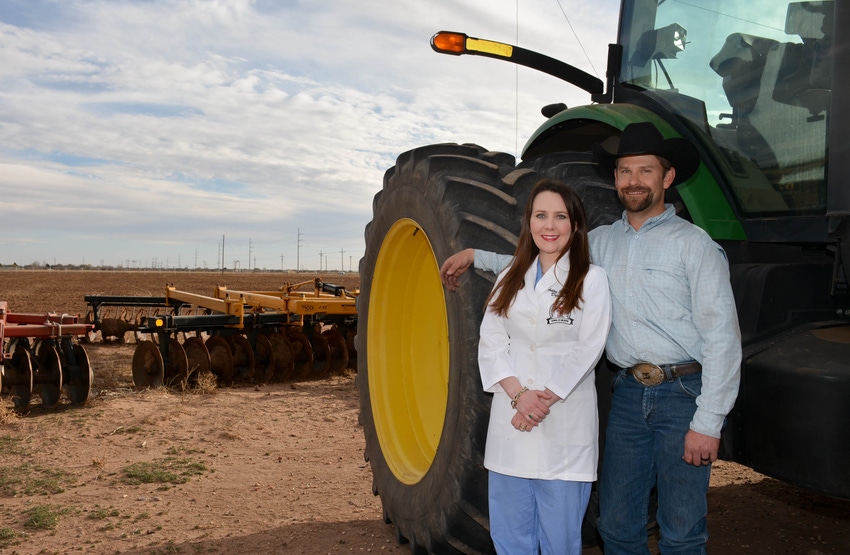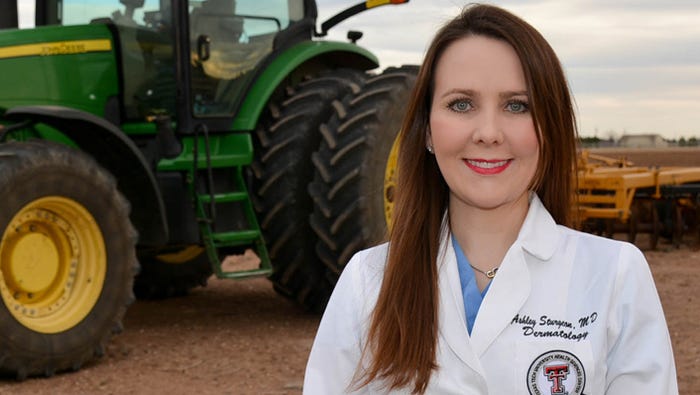“You hear about melanoma being deadly and horrible and it certainly is, but if you catch it early a simple procedure could cure it. Once a month, check over your skin to make sure nothing is growing or changing and report any unusual behavior to a dermatologist immediately.”

While U.S. farmers and ranchers spend much of their season under the sun’s spotlight checking cattle, sprinklers, moisture and their crops, dermatologist Dr. Ashley Sturgeon urges them to take time to check their skin for any signs of skin cancer.
Sturgeon, a farmer’s wife and assistant professor of dermatology at Texas Tech University Health Sciences Center, Lubbock, Texas, suggests growers check their skin monthly on the first day of the month, or “whenever you can remember,” she says.

Dr. Ashley Sturgeon, farmer’s wife and assistant professor of dermatology at Texas Tech University Health Sciences Center, Lubbock, Texas
“Skin checks are really important because there are things that someone might find that they won’t show a dermatologist, so it's really important to find things before they become problems,” explains Sturgeon. “If you catch things early, its most often an easy fix.”
And while every skin cancer is not as bad as melanoma, she says early detection is the key. “You hear about melanoma being deadly and horrible and it certainly is, but if you catch it early a simple procedure could cure it. Once a month, check over your skin to make sure nothing is growing or changing and report any unusual behavior to a dermatologist immediately.”
Areas of concern
Areas of concern for farmers and ranchers from sun exposure most often occur above the waist. “The most common areas that I see skin cancers, especially on our farmers, are on the tops of the hands and arms. The nose gets a lot of sun, so even if you wear your sunscreen, that sunscreen gets rubbed off,” says Sturgeon, who warns that sunscreen needs to be reapplied. “I think the scalp for people who don't wear caps is really an issue and the back of the neck, so any sun exposed area really is the highest risk for people who work outdoors.”
The tops of ears are also of concern for agricultural workers. “Right on the tops of the ears you'll just get something that's really dry and scaly and that can be a little precancerous lesion. If we catch those early we just freeze them and it's no big deal. They don't have to become a big skin cancer that requires lots of surgery,” says Sturgeon.
“The unfortunate thing about ears is sometimes if a skin cancer gets too big it can be very disfiguring when you take it off. Your ears are very cosmetically sensitive areas, so we like to catch those when they're really small or prevent them from happening at all.”
Another area of concern are the eyelids. “Wearing sunglasses is also really important,” says Sturgeon, who recommends sunglasses with pigment for protection. “Eyelid skin cancers can certainly happen on the eyelids and so physically protecting your eyes with sunglasses is better.”
Prevention
At home, Sturgeon says she used to nag her cotton farmer/husband Jason about protecting his skin but after hearing about the horrible cases and things that she’s seen, her husband became a believer. “He was very non-compliant at first,” she says. “I quit nagging him — I had given up. Then he starts hearing about the skin cancer surgeries that I'm doing and he started doing it on his own.”
One of the changes her farmer has made is wearing long-sleeved shirts with a UPF or UV protective factor label. “I got my husband to start wearing long sleeve shirts a few years ago because I told him if you grow a skin cancer and have to get it sewn up, you can't lift anything over 15 pounds for two weeks. Now it's his mission in life to make sure that he never grows anything that has to be sewn up on his arms. And he's found the long-sleeved shirts to be cooler.”
Shirts without UPF can still expose even covered skin to the sun, warns Sturgeon. “Farmers, who have never gone shirtless, you'll see sunspots on their shoulders just because the sun has made it through their clothing. So, what kind of protective clothing you pick really makes a difference.”
See, I’d stand naked for much less, http://bit.ly/2pcdzPB.
Sturgeon recommends daily application of sunscreen with a SPF rating of 30 or greater. “What I found works really well is the spray sunscreen,” explains Sturgeon. “What my husband complains about the most is he doesn't want to put on a cream after his hands are greasy and dirty. So, the sprays are really nice and they're also kind of cooling on a really hot day.”
Reapplication of sunscreen every two hours is also important, she says. “The spray sunscreen doesn't give as even a cover as the cream sunscreen, but the chairman of my department says that the best sunscreen you have is the sunscreen you'll use. Reapplying that spray during the day is better than not reapplying anything.”
While she says you’re never too young to start checking your skin, Sturgeon pleads with famers to have a yearly, full body skin examination. “It's so important. If I catch something early it can be an easy fix. But if you wait until it becomes noticeable to you, that's when it can be a problem. And skin cancer can go from not a big deal to a really big deal in just a matter of months. So, get your skin checked and check yourself as often as you can.”
About the Author(s)
You May Also Like



